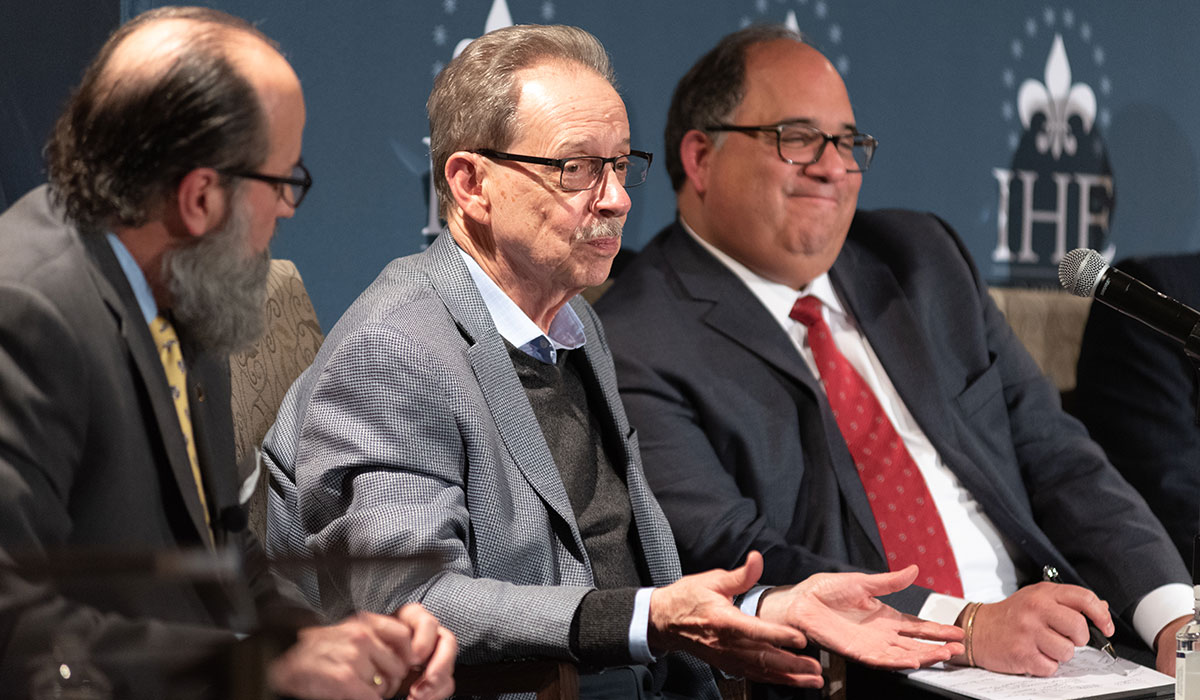
Photo credit: Deirdre McQuade/D McQuade Studios
Is it possible to consider human dignity in a field that includes manipulation and deceit? What moral obligations are involved in a life of espionage?
Those were the questions up for discussion during a recent event, “The Humanity of Espionage.” The panel discussion, which included four former CIA spy handlers, was held on Feb. 28 at The Catholic University of America.
Event moderator Nicholas Dujmovic, assistant professor and director of the University’s Intelligence Studies Program, previously worked at the Central Intelligence Agency for 26 years. He began the night’s discussion by defining espionage as the collection of national security intelligence through human means, in which a U.S. case officer, or handler, is passed information from a foreign national, or spy.
“At its core, espionage always involves a relationship,” Dujmovic said.
 Dujmovic was joined during the evening by John Bennett, a former director of the National Clandestine Service at the CIA; Juan Cruz, a former career CIA operations and case officer; Gil Kindelan, a retired case officer with 34 years of government service in the US Army and the CIA; and Scotty Skotzko, who served 40 years as a CIA operations officer with eight oversea postings.
Dujmovic was joined during the evening by John Bennett, a former director of the National Clandestine Service at the CIA; Juan Cruz, a former career CIA operations and case officer; Gil Kindelan, a retired case officer with 34 years of government service in the US Army and the CIA; and Scotty Skotzko, who served 40 years as a CIA operations officer with eight oversea postings.
The discussion was the fourth in a series of events cosponsored by the Intelligence Studies Program and the University’s Institute for Human Ecology. Dujmovic said the night’s purpose was to explain how a life in intelligence really works and how it can affect those in the field.
The four case officers began the discussion by sharing how they viewed their work. Skotzko compared working as a case officer to being “a professional opportunist,” who is skilled at “establishing relationships and looking for converging interests.”
For him, the process of building relationships with potential spies, is “a process of helping them find purpose in doing what you want them to do.”
Bennett said the job involved three stages: deception, manipulation, and corruption. At the heart of espionage, he continued, is always a paradox: “This relationship formed on the basis of deception has to be a relationship of absolute trust both ways.”
Cruz described his case officer work as a privilege, and compared the relationship formed between a spy and his handler to “a covenant, not unlike marriage.”
“It’s a bond forged in hardships and risks, for a greater good,” Cruz said. “A good case officer is a teacher, a student, a father, a shoulder to cry on, an amateur psychologist, a confessor, and if you’re lucky, a friend.”
As the night continued, the men discussed the challenges of recruiting new informants and later terminating those relationships in a way that is safe for both parties.
“Finding the right timing for recruitment is actually really tough, it’s not something like flipping a coin,” said Cruz. “It’s the same thing with termination. It must be done as professionally and carefully as possible. And you should always know how it’s going to go.”
Bennett said it is important to know a spy’s motivations. While some are giving information because it’s the right thing to do, others do it for “simply transactional” reasons, or as a way to inflict harm on a regime.
The men also talked about the moral “red lines” intelligence officers should never cross, which included acts of intimacy, lethal force, and blackmail.
At the end of the conversation, the former case officers shared regrets and discussed their personal experiences losing assets and colleagues.
“At every phase of my career, I have lost colleagues along the way,” said Bennett. “We never forget them and it never gets easier.”